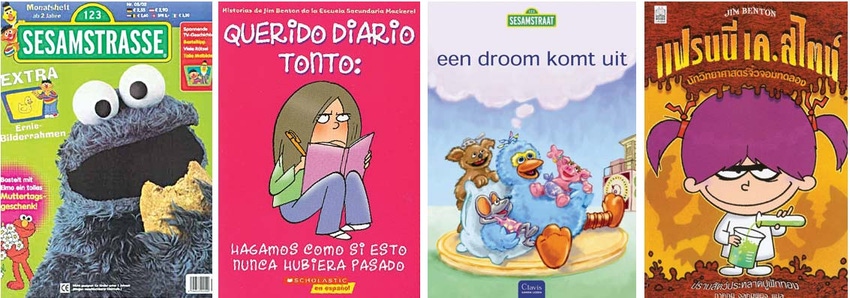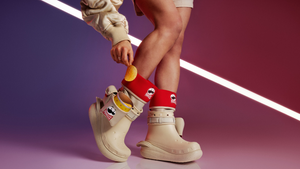]> PHAT FASHIONS was founded in 1992 by Russell Simmons, who successfully launched Def Jam Recordings, a company dedicated to rap, hip-hop, and R&
April 6, 2018

]>
PHAT FASHIONS was founded in 1992 by Russell Simmons, who successfully launched Def Jam Recordings, a company dedicated to rap, hip-hop, and R&B music. He built an entire lifestyle around this genre of music, and launched the Phat Farm label with the tagline: "Classic American Flava." Total annual turnover for Phat Fashions, including the Baby Phat label, currently is roughly $750 million at retail. In February '04, Bernt Ullmann was appointed president of Phat Fashions, and was hired in conjunction with Kellwood's acquisition of the company. While Ullmann was employed by GTFM and served as president of FUBU International, which held the license for Phat Farm in Europe, he worked closely with Simmons. Ullmann currently is involved in all aspects of running and optimizing the business, which includes overseeing its collections and wholesale efforts, negotiating all of its licensing agreements, as well as being actively involved in the marketing efforts. Next year, Phat Fashions will celebrate its 15th anniversary, proving the validity of Simmons' vision. 

Q: Describe your organization's structure.
Phat Fashions is divided into two operating units: Phat Wholesale and Phat Licensing. Its primary core competency lies within men's sportswear.
Although Kellwood has core competency within a number of other product categories, we have chosen to remain true to Phat's original business model. All product categories other than young men's are licensed. A separate licensing division employs 15 individuals in various brand management and marketing capacities.
Q: Who is your target customer?
Phat targets 18- to 35-year-old consumers who are racially and economically diverse. The age reference is more of an attitude than a physical age. Our brands attract youth wishing to be affiliated with our lifestyle, as well as "seniors" compelled by our classic sensibilities.
Phat aims to offer superior value rather than delivering a particular price point. A basic pair of jeans retails for approximately $48, while a pair of high-fashion Phat Farm jeans can retail in the mid-$80s and even higher for Baby Phat.
Q: When did Phat Fashions first venture into licensing?
The first license was issued in 1995 for Phat Farm footwear due to this category's relevance in the streetwear market.
Q: How many licensees does the brand have and in what categories?
Both Phat Farm and Baby Phat are comprehensive lifestyle brands. We currently have 26 licensees covering 38 different categories as diverse as infant boxed sets and home soft goods. We are always exploring new options. New releases will include swimwear and luggage for both the Phat Farm and Baby Phat labels. Phat Farm is set to launch a new fragrance, Atman - Spirit of Man, and Baby Phat will introduce a follow-up fragrance, Golden Goddess, as a successor to the Goddess fragrance.
Q: When did Baby Phat venture into licensing? What was the first category licensed and why? What's next for the brand?
In an effort to promote a Phat Farm runway show, Simmons manufactured "shrunken" T-shirts for the models. He cleverly called the Ts "Baby Phat" because of the small sizes. When the models wore the shirts, it sparked demand for Baby Phat. Russell then appointed Kimora Lee Simmons chief creative officer of Baby Phat.
Baby Phat junior sportswear was licensed in 1999. More than 20 categories have been introduced since then. Look for further expansion into the home and beauty categories.
Q: Describe some of your licensing successes to date.
Phat has seen a number of successful product launches and merchandising concepts over the last several years. Among them are Baby Phat's athletic footwear and dress shoes, as well as the merchandising concept of "Dress Phat," a dress-up concept comprising tailored clothing, dress shirts, and neckwear.
Q: How many Phat Farm retail doors have opened to date?
We currently have seven freestanding flagship stores. These showcase the "World of Phat" and offer all available Phat Farm and Baby Phat categories. Both the Phat Farm and Baby Phat lifestyles are shown in their entirety.
Our stores currently are located in New York's SoHo area, Montreal, Dubai, Abu Dhabi, Sharjah in the United Arab Emirates, and Shanghai. We are slated to open our first European freestanding store in Madrid in October. A significant number of additional stores are planned both internationally and domestically.
Q: Do you have any retail exclusives or direct-to-retail deals?
We don't do a lot of DTRs, but we do offer SMUs (special make up) as a means for the retailers to have proprietary products.
Q: What has Phat Farm done to maintain and drive new business?
Our biggest drivers are the built-in exposure we receive through our recognizable celebrity figureheads: Russell Simmons, Kimora Lee Simmons, and Rev Run (head of Phat Farm footwear). They all generate a lot of media attention and recently have released books. In addition, both Kimora and Rev Run have TV shows slated for the fall.
While we remain 100 percent true to our core vision and philosophy, we constantly are ensuring that our message and approach remain current. As a global lifestyle company, we must remain consistent while being relevant to our core consumer. Our current focus is on licensing, international expansion, and retail rollout.
Q: What plans do you have for your international distribution?
Phat Fashions currently is established in Canada, the Middle East, Europe, China, and Japan. We are in advanced negotiations on several other markets.
Some of the challenges include fit, local customs, and seasonal products. We have expanded our size ranges all the way down to X-small and have narrowed our fits. We typically will allow some manufacturing on behalf of our partners. However, this is mostly done in our own factories for consistency reasons.
Q: What challenges do you face?
The biggest challenge is to maintain a seamless transition from in-house to licensed products. The licensed categories must be natural extensions of the core brand. Integrity must be maintained in design, quality, and deliveries.
You May Also Like






